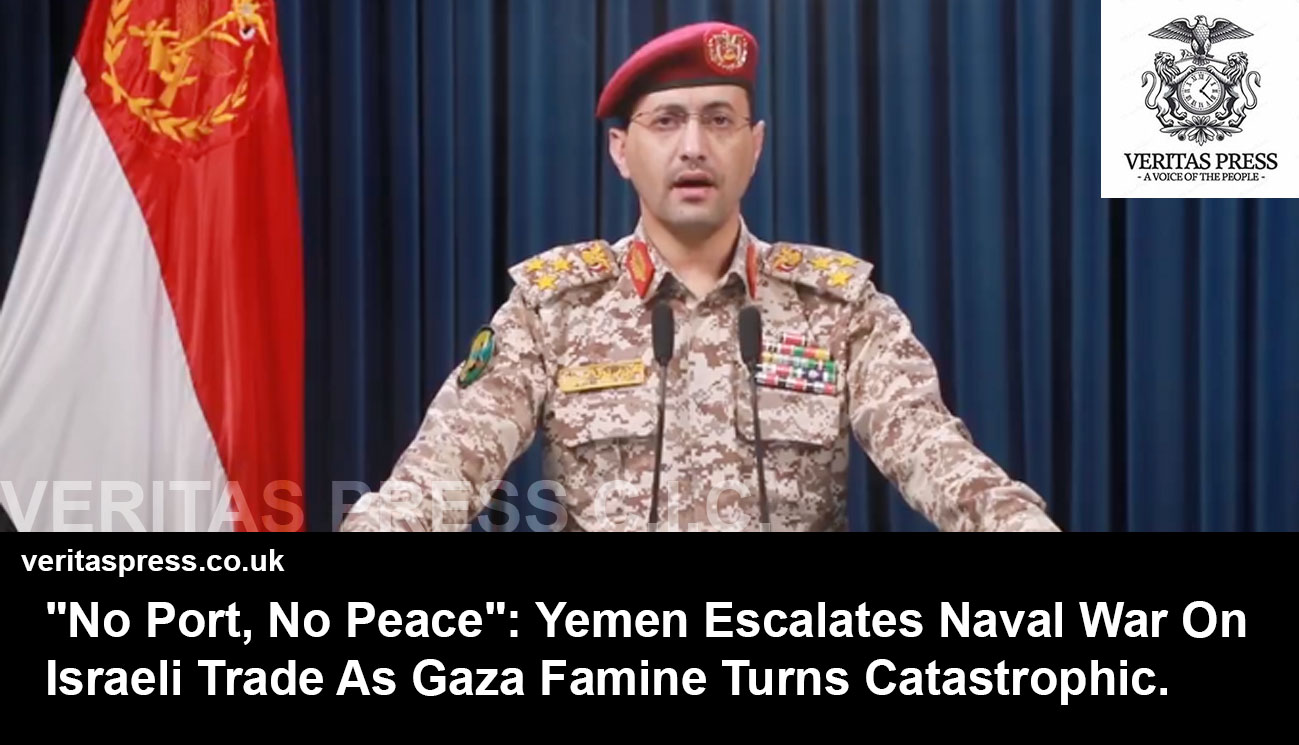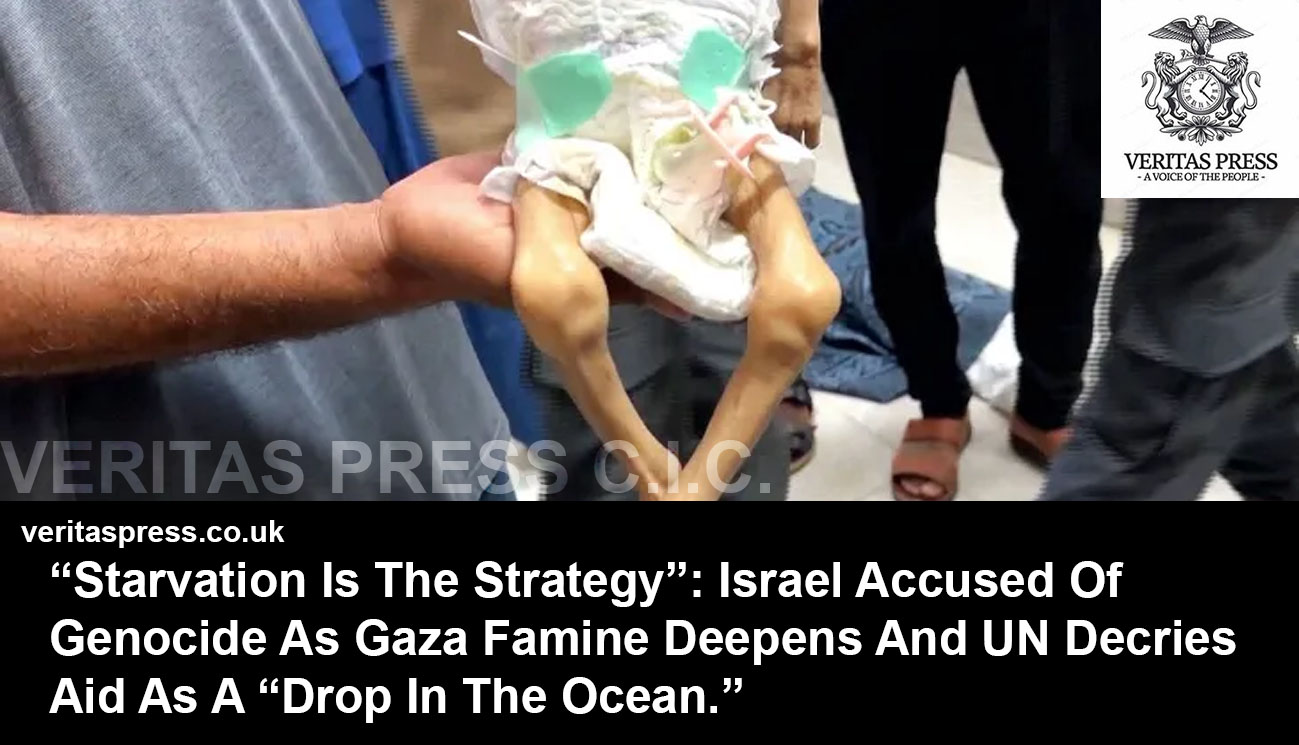As famine deepens in Gaza and the humanitarian crisis spirals into catastrophe, Yemen’s Houthis have launched the fourth and most expansive phase of their maritime campaign against Israel. In a sweeping escalation, the group declared on Sunday that it will target any vessel operated by companies that conduct business with Israeli ports, regardless of nationality, route, or destination.
“From this moment forward, every ship tied to a company that deals with the Israeli enemy is a legitimate target for our drones and missiles,” declared Brig. Gen. Yahya Saree, spokesperson for the Yemeni Armed Forces (YAF), in a televised statement. “No ship will be safe within our reach.”
The new threat, which effectively extends Yemen’s blockade beyond direct Israeli shipping to the global web of maritime commerce, has set off alarm bells across the international shipping industry and sharpened scrutiny on the world’s continued complicity in Israel’s war on Gaza.
“A Moral Obligation” Or Maritime Hostage-Taking?
The Houthis, who control northern Yemen and its Red Sea coastline, framed their escalation as a “moral and humanitarian obligation” to act against what they describe as a genocide in Gaza.
“No free person on this earth can accept what is happening in Gaza,” the statement read. “This is not politics. This is humanity.”
The Iranian-aligned group has been enforcing a de facto naval blockade on Israeli-linked ships since November 2023, citing Israeli war crimes and the international community’s failure to respond. But analysts say the fourth phase marks a dramatic shift from symbolic resistance to strategic disruption.
“This is no longer just about solidarity,” said maritime security analyst Hugh Dunleavy of the London-based Maritime Risk Bureau. “This is a calculated escalation designed to cripple Israeli trade and force the hand of global corporations. The Houthis are weaponising the world’s silence.”
Eilat Port Collapse: A Canary In The Economic Coal Mine.
The Houthis’ campaign has already yielded significant results. The Marker, an Israeli financial daily, reported on Sunday that Eilat Port, the country’s southern trade lifeline, has ceased operations entirely. The city’s municipality froze the port’s bank accounts over millions of shekels in unpaid taxes and debt.
The closure follows months of financial freefall. In early 2024, The Marker reported that Eilat’s shipping revenue had plummeted by 80%, after most international carriers rerouted vessels around Africa to avoid Yemen’s missile and drone range in the Red Sea.
“The economic strangulation of Eilat is complete,” said Israeli economic analyst Lior Avrahami. “This is no longer a minor insurgent disruption. It’s an international trade crisis born from political abandonment.”
Even Israel’s Finance Ministry has admitted the blockade is having “a measurable impact on port throughput and trade costs.” A confidential briefing obtained by Haaretz in June warned that “continued paralysis of Red Sea access will have ripple effects on inflation, fuel imports, and critical supply chains.”
Gaza: A Manufactured Famine, A Global Farce.
While Israeli shipping collapses under naval pressure, conditions in Gaza, whose siege the Houthis claim to be fighting to break, have deteriorated to levels described by humanitarian officials as “beyond famine.”
According to the Government Media Office in Gaza, only 73 aid trucks entered the besieged enclave on Sunday. The office denounced the delivery as “grossly inadequate,” especially given the scale of need for Gaza’s 2.2 million residents, more than half of whom are children.
“Babies are dying of dehydration. Mothers are collapsing from starvation. And the world drops a few boxes of expired crackers into combat zones and calls it aid,” said Dr. Fadel Naim, a surgeon at Al-Ahli Hospital in Gaza City. “What’s happening here is not neglect; it is engineered, deliberate starvation.”
The Office further accused Israeli forces of facilitating looting by armed gangs, stating that airdrops were often made into conflict zones and that soldiers “watched without intervention.”
“These operations are a farce,” read the government statement. “Three days of airdrops don’t equal two trucks of aid. This is not humanitarian relief, it’s propaganda.”
Humanitarian organisations agree. Jan Egeland, Secretary General of the Norwegian Refugee Council, called the airdrop campaigns “performative humanitarianism” that substitutes spectacle for substance. “Nothing replaces coordinated ground access. Airdrops are desperation tactics. If the international community were serious, they’d be demanding Israel open the crossings.”
The UN Office for the Coordination of Humanitarian Affairs (OCHA) has repeatedly warned that northern Gaza is already in famine conditions, with children dying daily from preventable starvation and disease.
A Global Complicity, A Growing Conflagration:
The Houthis have repeatedly warned that international inaction will lead to escalation. Their statement on Sunday made this explicit:
“If world governments wish to avoid further escalation, they must pressure the Israeli enemy to halt its aggression and lift the blockade on Gaza.”
This sentiment was echoed by Hussein al-Ezzi, Deputy Foreign Minister of the Houthi-led government in Sanaa, who told Al Mayadeen that Yemen “will not sit idly by while Gaza is starved and bombed into extinction.”
Critics say the U.S. and Europe have enabled Israel’s campaign through weapons sales and diplomatic cover while ignoring Gaza’s collapse into mass death. According to Amnesty International, Washington’s arms shipments and vetoes at the UN Security Council make it “directly complicit in war crimes and starvation tactics.”
In May, the Biden administration reportedly struck a backroom understanding with the Houthis, halting airstrikes in exchange for a pause in Red Sea attacks. But Yemeni officials clarified that Israeli-linked vessels were not included in the deal, a loophole now being used to full effect.
Conclusion: A World On Notice And On Trial.
The Houthis’ fourth-phase naval escalation is not merely a regional flare-up; it is a blistering indictment of a global system that has normalised siege warfare, starvation, and collective punishment. As Gaza descends into a man-made famine, Yemen’s Red Sea campaign is exposing the profound moral bankruptcy of international diplomacy and humanitarian theatre.
For nearly ten months, global powers have watched Israel reduce Gaza to rubble, killing over 100,000 people, bombing hospitals, blocking food, and razing entire neighbourhoods, while offering nothing more than airdrop stunts and diplomatic euphemisms. In that vacuum of action, Yemen’s missiles have become a crude but effective form of geopolitical resistance, forcing shipping giants and foreign governments to confront the cost of their complicity.
“When the law is silent and diplomacy is cowardly, disruption becomes the only language the world will hear,” said human rights lawyer Raji Sourani, founder of the Palestinian Centre for Human Rights.
But this is not just a story of solidarity; it is also a warning. The collapse of Eilat Port signals what may come next: a regional unravelling with global consequences. Every ship rerouted, every port shuttered, every freight delay is not just economic fallout; it is a direct consequence of the international community’s failure to confront genocide.
As the West obsesses over “freedom of navigation,” Yemen is flipping the question: What about freedom from starvation? What about the right to survive?
This is no longer about the Houthis or the Red Sea. This is about the price of inaction. Until Gaza breathes, no route is safe, no economy stable, no conscience clean. The blockade is no longer just on Palestinians; it is on the credibility of a global order that has watched genocide unfold in real time and chosen business over humanity.
Advertisements
Sports Headlines
- Shahrukh Khan Gets Flak Over Bangladesh Cricketer In Kolkata Knight Riders
- F1 2026 Rules Explained: What Is Overtake Mode, Active Aero And Where Is DRS?
- Bangladesh Will Not Play T20 World Cup Matches In India, Decision Taken In Context Of BCCI’s ‘Extreme Communal Policy’
- Root, Brook Tame Australia In Rain-Hit 5th Ashes Test
Tags:
































Leave a Reply